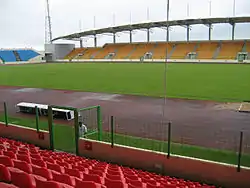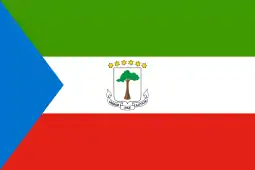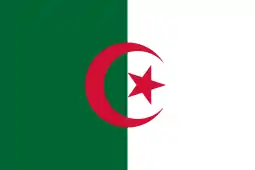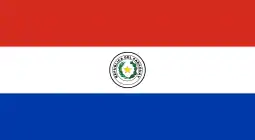Equatorial Guinea national football team
The Equatorial Guinea national football team, nicknamed Nzalang Nacional, represents Equatorial Guinea in international football and is controlled by the Equatoguinean Football Federation, a member of the Confederation of African Football (CAF).
| Nickname(s) | Nzalang Nacional (National Thunder) | ||
|---|---|---|---|
| Association | Equatoguinean Football Federation | ||
| Confederation | CAF (Africa) | ||
| Sub-confederation | UNIFFAC (Central Africa) | ||
| Head coach | Juan Micha and Casto Nopo | ||
| Captain | Emilio Nsue | ||
| Most caps | Iván Zarandona (41) | ||
| Top scorer | Emilio Nsue (11) | ||
| Home stadium | Estadio de Malabo | ||
| FIFA code | EQG | ||
| |||
| FIFA ranking | |||
| Current | 134 | ||
| Highest | 49 (February 2015) | ||
| Lowest | 195 (December 1998) | ||
| First international | |||
(China; 23 May 1975) | |||
| Biggest win | |||
(Malabo, Equatorial Guinea; 4 September 2016) | |||
| Biggest defeat | |||
(Congo; 13 December 1990) | |||
| Africa Cup of Nations | |||
| Appearances | 2 (first in 2012) | ||
| Best result | Fourth place (2015) | ||
The team has never qualified for the FIFA World Cup, but has qualified for the Africa Cup of Nations twice, both as hosts in 2012 and 2015. It reached the quarter-finals of the former and came fourth at the latter.
History
Equatorial Guinea played its first match on 23 May 1975 against China in a friendly, losing 6–2. They did not play another game until entering the 1985 UDEAC Cup in December 1985. They were drawn in a group against the hosts Congo and Central African Republic. They lost 5–0 to the Congo on 9 December and then earned their first draw by drawing 1–1 against the Central African Republic on 14 December. On 16 December, they played a play-off for fifth place against Chad, and lost 3–2 on penalties after a 1–1 draw.[2]
Equatorial Guinea would come in fourth in the 1987 UDEAC Cup, losing on penalties in the third place match to Gabon, even though they only scored one goal throughout the tournament in a 1–1 draw against Chad. They also drew 0–0 against Cameroon. On their next attempt, they got sixth place after losing on penalties against the Central African Republic. The next time Equatorial Guinea played the Central African Republic, in 1999, they won, 4–2. It was Equatorial Guinea's first win.[2]
In the late 2000s, the Equatoguinean Football Federation, along with the Gabonese Football Federation, announced a bid to host the 2012 Africa Cup of Nations, against bids from other African nations including Angola, Libya and Nigeria. Equatorial Guinea and Gabon won the right to host the games,[3] and two new stadiums were built in Equatorial Guinea: Estadio de Bata in Bata and Estadio de Malabo in Malabo.[4]
The first game in the 2012 African Cup of Nations was Equatorial Guinea's first in a major international tournament, and resulted in a historic 1–0 win over Libya on 21 January 2012 in the opening game of the tournament. An 87th-minute strike from former Real Madrid winger Javier Balboa earned the victory.[5] In the next game, they secured the qualification for the quarter-finals by beating Senegal 2–1,[6] and finished second in their group after losing 0–1 to Zambia.[7] They progressed to the quarter-finals where they were eliminated by the tournament's runners-up Ivory Coast after losing to The Elephants 3–0 thanks to goals from Didier Drogba and Yaya Touré.[8] Various national side players were praised due to their performances in the tournament, including Javier Balboa, Randy, Ben Konaté and Rui, the latter a part of the Team of the Tournament.[9]
Three years later, Equatorial Guinea organized solely the 2015 edition of the Africa Cup of Nations, but on this occasion, it was to replace Morocco, which was the original host. In the opener, they drew 1–1 against Congo, with Emilio Nsue opening the scoring. In the second game, they managed to play out a 0–0 draw with Burkina Faso, the runners-up of the previous edition. With these two results, the Nzalang Nacional had to win against its classic rival Gabon in the third match in order to qualify for the quarter-finals. Equatorial Guinea won 2–0 with goals from Javier Balboa (a penalty kick) and Ibán. As Group A's runner-up, the Equatoguinean national team then defeated Tunisia 2–1 with two goals from Balboa, the first being a penalty kick in the final moments of the regular time, and the second was in extra time. In the semi-final, however, they lost 0–3 to Ghana, and in the match for third place, drew 0–0 against DR Congo, ultimately losing 2–4 on penalties. The country finished the tournament in fourth place, being its best international participation to date and helping it reach a historical 49th position in the FIFA rankings.
Equatorial Guinea continued to fail in every qualification in AFCON as the team did not qualify for 2017 and 2019 editions. Likewise, the team had also failed to qualify for 2018 FIFA World Cup. During the 2021 Africa Cup of Nations qualification, they were grouped in group J along with powerhouse Tunisia, 2019 AFCON participant Tanzania and North African bedfellow Libya. The Nzalang Nacional performed poorly in their first two games, losing both with one goal margin to Tanzania away and Tunisia at home, and it appeared that Equatorial Guinea would just end up failing as usual as the team had never qualified throughout regular qualification outside hosting the competition twice.[10][11] However, the COVID-19 pandemic led all AFCON qualification suspended until late 2020, when it resumed as Equatorial Guinea faced up against a rising spirit Libyan side that aimed to qualify for the first time since 2012. Despite this, Equatorial Guinea produced an outstanding comeback against Libya in Egypt, beating Libya 3–2 with two late goals by Pedro Obiang and Salomón Obama from being led 1–2 until injury times.[12] The Nzalang Nacional then later hosted the same opponent at home, and like their game in Cairo, the Equatorial Guineans won again, 1–0, by virtual goal from Iban Salvador.[13] Adding with Tunisia managed to beat Tanzania 1–0 in Tunis and drew the same opponent 1–1 in Dar es Salaam, Equatorial Guinea is now having a historic chance to qualify throughout regular qualification for the first time ever in the history, if they can beat Tanzania in the decisive game at home soil.
Naturalised players controversy
In recent years, Equatorial Guinea has courted controversy by recruiting foreign players and giving them citizenship despite having little or no ties to the country. In 2009, South African journalist and FIFA archivist Mark Gleeson wrote that it was undermining the integrity of African football.[14]
In late 2005, and at the request of Ruslán Obiang Nsue, a son of President Teodoro Obiang, Brazilian coach Antônio Dumas recruited several Brazilian players to represent the Equatorial Guinea but the CAF and FIFA turned a blind eye, despite complaints from other nations.
In 2012, having lost the first leg of a 2013 Africa Cup of Nations qualification round 4–0 to the Democratic Republic of the Congo, Equatorial Guinea recruited nine Brazilian players to help overturn the deficit for the second leg. The team did manage to win the match 2–1, but it was not enough to overturn the aggregate and Equatorial Guinea were eliminated from the tournament. DR Congo head coach Claude Le Roy complained that the Equatorial Guinea were acting like the "United Nations of football".
Before the arrival of new coach Andoni Goikoetxea to Malabo, in March 2013, the Equatoguinean board made the squad for the 2014 FIFA World Cup qualifying match against Cape Verde and again called-up nine Brazilian players.[15] In May 2013, they joined Colombian-born, Ecuadorian-based Jimmy Bermúdez, to who was going to pay him €3,000 for each match he plays.[16]
During the qualifiers, in the series played against Mauritania, the Nzalang Nacional lost 1–0 away and won 3–0 in Malabo, qualifying to the next round to face Uganda. However, the Mauritanian Football Federation Submitted a complaint to CAF about the inclusion of ineligible players by Equatorial Guinea (Some with fake passports and false names), resulting in the expulsion of the Equatorial Guinean team, based on the particular situation of Thierry Fidjeu, while the cases of the other players remained under investigation.
Home stadium

Equatorial Guinea's home stadium is Estadio de Malabo in Malabo. It can hold up to 15,250 people. Equatorial Guinea played there when they hosted the 2012 African Cup of Nations During their participation in the tournament, they played in this stadium against eventual winners Zambia and runners-up the Ivory Coast. During the national side's participation in the 2012 African Cup of Nations, they also played in the newly constructed Estadio de Bata, in which they played and won both their games in the stadium against Libya and Senegal.[4]
Kit and colors
Equatorial Guinea wears a red and white uniform. The kit manufacturer is Errea. When they play in Equatorial Guinea, they wear a solid red jersey and matching shorts with white stripes. The number, FEGUIFUT logo, and Adidas logo are located on the chest. The socks are red with white at the top.[17] When Equatorial Guinea is away, they wear all white shirt with blue stripes.
Achievements
- CEMAC Cup: 1
- 2006
World Cup record
| FIFA World Cup record | FIFA World Cup qualification record | ||||||||||||||
|---|---|---|---|---|---|---|---|---|---|---|---|---|---|---|---|
| Year | Round | Position | Pld | W | D* | L | GF | GA | Pld | W | D | L | GF | GA | |
| Did not enter | Did not enter | ||||||||||||||
| Did not qualify | 2 | 0 | 0 | 2 | 2 | 5 | |||||||||
| 2 | 1 | 0 | 1 | 1 | 2 | ||||||||||
| 6 | 1 | 0 | 5 | 4 | 10 | ||||||||||
| 8 | 1 | 2 | 5 | 9 | 17 | ||||||||||
| 2 | 1 | 0 | 1 | 1 | 2 | ||||||||||
| To be determined | To be determined | ||||||||||||||
| Total | – | 0/21 | – | – | – | – | – | – | 20 | 4 | 2 | 14 | 17 | 36 | |
Africa Cup of Nations record
| Africa Cup of Nations record | ||||||||
|---|---|---|---|---|---|---|---|---|
| Host nation(s) / Year | Round | Position | Pld | W | D* | L | GF | GA |
| Part of | ||||||||
| Not affiliated to CAF | ||||||||
| Withdrew | ||||||||
| Did not qualify | ||||||||
| Did not enter | ||||||||
| Withdrew | ||||||||
| Did not enter | ||||||||
| Did not qualify | ||||||||
| Quarter-finals | 7th | 4 | 2 | 0 | 2 | 3 | 5 | |
| Did not qualify | ||||||||
| Fourth place | 4th | 6 | 2 | 3 | 1 | 5 | 5 | |
| Did not qualify | ||||||||
| To be determined | ||||||||
| Total | Fourth place | 2/32 | 10 | 4 | 3 | 3 | 8 | 10 |
Recent schedule and results
The following is a list of match results from the previous 12 months, as well as any future matches that have been scheduled.
Win Draw Loss
2020
| 11 November 2021 AFCONQ | Libya | 2–3 | | Cairo, Egypt |
| 21:00 UTC+2 |
|
Report | Stadium: Al Salam Stadium[note 1] Referee: Bakary Gassama (Gambia) |
| 15 November 2021 AFCONQ | Equatorial Guinea | 1–0 | | Malabo, Equatorial Guinea |
| 20:00 UTC+1 | Salvador |
Report | Stadium: Estadio de Malabo Referee: Norman Matemera (Zimbabwe) |
2021
| 22 March 2021 AFCONQ | Equatorial Guinea | v | | |
| --:-- UTC+1 |
| 30 March 2021 AFCONQ | Tunisia | v | | |
| --:-- UTC+1 |
Players
Current squad
The following players had been called up for two 2021 Africa Cup of Nations qualification Group J matches against Libya on 11 and 15 November 2020.[18]
Caps and goals updated as of 15 November 2020 after the match against Libya.[19]
| No. | Pos. | Player | Date of birth (age) | Caps | Goals | Club |
|---|---|---|---|---|---|---|
| 1 | GK | Jesús Owono | 1 March 2001 | 3 | 0 | |
| 13 | GK | Aitor Embela | 17 April 1996 | 5 | 0 | |
| 22 | GK | Marcos Ondo | 13 August 2000 | 1 | 0 | |
| 3 | DF | Igor Engonga | 4 January 1995 | 23 | 1 | |
| 5 | DF | Cosme Anvene | 3 March 1990 | 7 | 0 | |
| 11 | DF | Basilio Ndong | 17 January 1999 | 17 | 0 | |
| 12 | DF | Miguel Nzang | 27 July 1990 | 8 | 0 | |
| 15 | DF | Carlos Akapo (captain) | 12 March 1993 | 16 | 1 | |
| 20 | DF | Marvin Anieboh | 26 August 1997 | 1 | 0 | |
| 21 | DF | Esteban Obiang | 7 May 1998 | 6 | 0 | |
| 23 | DF | Luis Meseguer | 7 September 1999 | 8 | 1 | |
| 2 | MF | Miguel Ángel Mayé | 8 December 1995 | 5 | 0 | |
| 4 | MF | Fede Bikoro | 17 March 1996 | 24 | 1 | |
| 7 | MF | Jordan Nsang | 8 July 1998 | 7 | 0 | |
| 8 | MF | Pedro Obiang | 27 March 1992 | 9 | 3 | |
| 10 | MF | José Machín | 14 August 1996 | 10 | 0 | |
| 14 | MF | Kike Boula | 17 January 1993 | 28 | 0 | |
| 16 | MF | Federico Nsué | 20 April 1997 | 2 | 0 | |
| 18 | MF | Valeriano Nchama | 18 June 1995 | 8 | 0 | |
| 6 | FW | Iban Salvador | 11 December 1995 | 23 | 3 | |
| 9 | FW | Salomón Obama | 4 February 2000 | 5 | 1 | |
| 17 | FW | José Boacho | 22 July 1998 | 19 | 2 | |
| 19 | FW | Pedro Oba Asu | 18 May 2000 | 8 | 1 | |
Recent call-ups
The following players have been called up in the last 12 months.
| Pos. | Player | Date of birth (age) | Caps | Goals | Club | Latest call-up |
|---|---|---|---|---|---|---|
| GK | Felipe Ovono | 26 July 1993 | 40 | 0 | v. | |
| MF | Emilio Nsué | 30 September 1989 | 23 | 11 | v. | |
| MF | Jannick Buyla | 6 October 1998 | 3 | 0 | v. | |
| MF | Rubén Belima | 11 February 1992 | 21 | 0 | v. | |
| MF | Pablo Ganet | 4 November 1994 | 19 | 2 | v. | |
| MF | Nico Kata | 15 January 1993 | 13 | 0 | v. | |
Notes:
- (PRE) Preliminary squad
- (RET) Retired from the national team
- (INJ) Injured
- (REJ) Rejected the call up
Records
- As of 15 November 2020[20]
- Players in bold text are still active with Equatorial Guinea.
|
|
Coaches
.svg.png.webp) Manuel Sanchís Martínez (1980)
Manuel Sanchís Martínez (1980) Julio Raúl González (1989–90)
Julio Raúl González (1989–90) Pedro Mabale (199?–1998)
Pedro Mabale (199?–1998) Jesús Martín Dorta (1999)
Jesús Martín Dorta (1999) Raúl Eduardo Rodríguez (2000)
Raúl Eduardo Rodríguez (2000) Juan Carlos Bueriberi Echuaca (2000–200?)
Juan Carlos Bueriberi Echuaca (2000–200?) Francisco Nsi Nchama (2002)
Francisco Nsi Nchama (2002) Jesús Martín Dorta (2003)
Jesús Martín Dorta (2003) Óscar Engonga (2003)
Óscar Engonga (2003) Adel Amrouche (2004)
Adel Amrouche (2004) Antônio Dumas (2004–2006)
Antônio Dumas (2004–2006) Quique Setién (2006)
Quique Setién (2006) Jordan de Freitas (2007–2008)
Jordan de Freitas (2007–2008) Vicente Engonga (2008–2009)
Vicente Engonga (2008–2009) Carlos Diarte (2009–2010)
Carlos Diarte (2009–2010) Casto Nopo (2010) caretaker
Casto Nopo (2010) caretaker Henri Michel (2010)
Henri Michel (2010) Casto Nopo (2011) caretaker
Casto Nopo (2011) caretaker Gílson Paulo (2012)
Gílson Paulo (2012) Andoni Goikoetxea (2013–2014)
Andoni Goikoetxea (2013–2014) Esteban Becker (2015–2017)
Esteban Becker (2015–2017) Casto Nopo (2017) caretaker
Casto Nopo (2017) caretaker Franck Dumas (2017–2018)
Franck Dumas (2017–2018) Casto Nopo (2018) caretaker
Casto Nopo (2018) caretaker Ángel López (2018–2019)
Ángel López (2018–2019) Casto Nopo (2019) caretaker
Casto Nopo (2019) caretaker Dani Guindos (2019)
Dani Guindos (2019) Sébastien Migné (2019–2020)
Sébastien Migné (2019–2020) Juan Micha and
Juan Micha and  Casto Nopo (2020–)
Casto Nopo (2020–)
Coaches of local-based national team
 Rodolfo Bodipo (2017–2018)
Rodolfo Bodipo (2017–2018) Antonio Pancho (2019)
Antonio Pancho (2019) Felipe Esono (2019–present)
Felipe Esono (2019–present)
Notes
- Libya has played their home match outside Libya due to security concerns from the ongoing civil war.
References
- "The FIFA/Coca-Cola World Ranking". FIFA. 10 December 2020. Retrieved 10 December 2020.
- "Equatorial Guinea - List of International Matches". rsssf.com. RSSSF. 5 June 2006. Retrieved 29 January 2012.
- "Angola to host 2010 Nations Cup". bbc.co.uk. BBC Sport. 4 September 2006. Retrieved 27 September 2006.
- "Nuevo Estadio de Malabo". stadiumguide.com. The Stadium Guide. Retrieved 31 January 2012.
- "Balboa dá vitória à Guiné Equatorial" [Balboa gives the victory to Equatorial Guinea]. abola.pt. A Bola. 21 January 2012. Retrieved 24 January 2012.
- "Africa Cup of Nations: Equatorial Guinea in quarters as Senegal crash out". bbc.co.uk. BBC Sport. 25 January 2012. Retrieved 1 February 2012.
- "Africa Cup of Nations: Zambia book quarter-final slot". bbc.co.uk. BBC Sport. 29 January 2012. Retrieved 1 February 2012.
- "Ivory Coast 3−0 Equatorial Guinea". espn.com. ESPN. 4 February 2012. Retrieved 14 February 2012.
- "Orange CAN 2012 Best XI". cafonline.com. Confédération Africaine de Football. 12 February 2012. Retrieved 14 February 2012.
- https://www.goal.com/en-tza/news/afcon-2021-qualifiers-tanzania-didnt-collapse-against-equatorial-/n6mx5m4acy4f1tktczmp72azl
- https://www.europasur.es/deportes/algecirascf/Alavedra-Ganet-cara-cruz-Algeciras_0_1411359431.html
- https://www.cafonline.com/total-africa-cup-of-nations/2021/news/equatorial-guinea-leaves-it-late-to-beat-libya-in-cairo
- https://www.libyaobserver.ly/sports/libya-loses-1-0-equatorial-guinea
- "African football's integrity is undermined, by Mark Gleeson". WorldSoccer.com. 9 March 2009. Retrieved 2 January 2013.
- "Volante Neto é convocado pela Seleção de Guiné Equatorial" [Midfielder Neto is called for the national team of Equatorial Guinea] (in Portuguese). Barretos Esporte Clube. 10 March 2013. Archived from the original on 16 January 2014. Retrieved 11 March 2013.
- "Archived copy" (in Spanish). Archived from the original on 16 January 2014. Retrieved 17 June 2013.CS1 maint: archived copy as title (link)
- "Equatorial Guinea ANC Puma Home Shirt 2012". Football Shirts. Retrieved 31 January 2012.
- "FIFA World Cup Qatar 2022™ Qualifiers - Africa - Matches - South Sudan - Equatorial Guinea - FIFA.com". www.fifa.com.
- Mamrud, Roberto. "Equatorial Guinea - Record International Players". RSSSF.
External links
| Wikimedia Commons has media related to Equatorial Guinea national football team. |